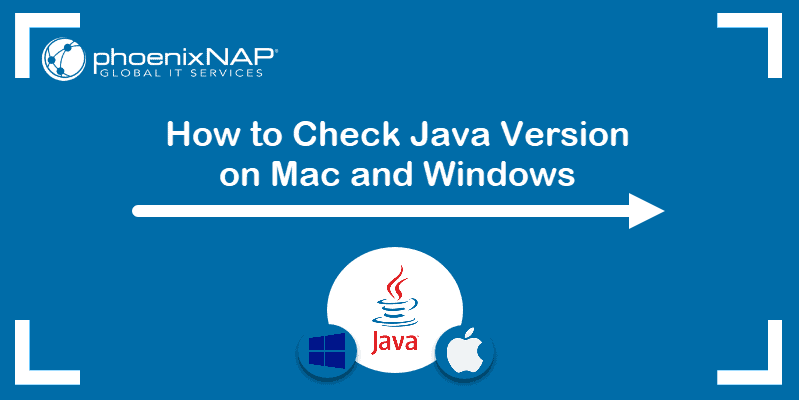

- #Current version of java for mac mac os x#
- #Current version of java for mac install#
- #Current version of java for mac update#
- #Current version of java for mac archive#
- #Current version of java for mac upgrade#
% /usr/libexec/java_home -v 1.8.0_06 -exec javac -versionįor more information, see the java_home(1) man page. To run a different version of Java, either specify the full path, or use the java_home tool: Java HotSpot(TM) 64-Bit Server VM (build 23.2-b04, mixed mode) Java(TM) SE Runtime Environment (build 1.8.0_06-ea-b13) If the installed version is 8u6, you will see a string that includes the text 1.8.0_06. All settings are kept in the separate folder (DBeaverData in user home) Java notes: DBeaver requires Java 11 or higher.
#Current version of java for mac upgrade#
Upgrade don’t be afraid to remove previous DBeaver version your settings won’t be lost.
#Current version of java for mac archive#
You can determine which version of the JDK is the default by typing java -version in a Terminal window. Do not extract archive over previous version (remove previous version before install). It is possible for the version of the JRE to be different than the version of the JDK.

When launching a Java application through the command line, the system uses the default JDK. There can be multiple JDKs installed on a system, as many as you wish. See "Note for Users of OS X that Include Apple Java 6 Plug-in". If you have not yet installed Apple's Java OS X 2012-006 update, then you are still using a version of Apple Java 6 that includes the plug-in and the Java Preferences app. Java HotSpot(TM) 64-Bit Server VM (build 25.Determining the Default Version of the JDK Java(TM) SE Runtime Environment (build 1.8.0_291-b10) It should output the following: java version "1.8.0_291" Let the system know where JRE is installed: sudo update-alternatives -install "/usr/bin/java" "java" "/usr/local/java/jre1.8.0_291/bin/java" 1Īfter that’s done, check the installation by running: java -version To save space, delete the tarball by running: sudo rm jre-8u291-linux-圆4.tar.gz Unpack the tarball: sudo tar zxvf jre-8u291-linux-圆4.tar.gz
#Current version of java for mac install#
Go into the install directory: cd /usr/local/java Move the JRE binaries into the directory: sudo mv jre-8u291-linux-圆4.tar.gz /usr/local/java InstallingĬreate a directory to install JRE in with: sudo mkdir /usr/local/java
#Current version of java for mac update#
Oracle does not currently offer JRE packages for Java 11 or above from their website so, for this tutorial, we will use the Oracle HotSpot JRE version to be 8u291 (Java 8, update 291). An Oracle account is needed to download the Oracle HotSpot JRE. tar.gz (tarball) by heading over to their website. Installing Oracle HotSpot JRE Downloading the Oracle HotSpot JRE binariesĭownload JRE binaries in. In the next step we’ll install Oracle HotSpot JRE. (Although the output may change in the future as new Java versions are promoted to LTS status, or the current LTS version receives updates.)
#Current version of java for mac mac os x#
Download Mac OS X Mountain Lion 10.8.5 latest version standalone offline DMG.

OpenJDK 64-Bit Server VM (build 11.0.11+9-Ubuntu-0ubuntu2, mixed mode) Java 7 and later versions are not supported by these older versions of Mac. OpenJDK Runtime Environment (build 11.0.11+9-Ubuntu-0ubuntu2) It should output the following: openjdk version "11.0.11" Ant supplies a number of built-in tasks allowing to compile, assemble, test and run Java applications. The main known usage of Ant is the build of Java applications. We can check if OpenJDK JRE was properly installed by running: java -version Apache Ant is a Java library and command-line tool whose mission is to drive processes described in build files as targets and extension points dependent upon each other. To install the OpenJDK JRE, we run: sudo apt install default-jre (Alternatively, you may opt to use a specific Java version, using for example the openjdk-11-jre package as updates are released for that version of the Java Virtual Machine, that packages will be updated, allowing you to stick to the latest and greatest update of one specific version of the Java language.) The default-jre is an excellent choice for most situations, thanks to the outstanding track of backwards compatibility of the Java Virtual Machine. Ubuntu offers the default-jre package, which is regularly updated to ship the latest version of the current OpenJDK JRE in Long Term Support (LTS). Moreover, the non LTS versions of Java are bringing a steady stream of innovation into the language, and also see some adoption. Nowadays, Java 11 is the current Long Term Support (LTS) version, but Java 8 is still widely used. With new versions of Java released every 6 months, there are multiple versions available for use.


 0 kommentar(er)
0 kommentar(er)
